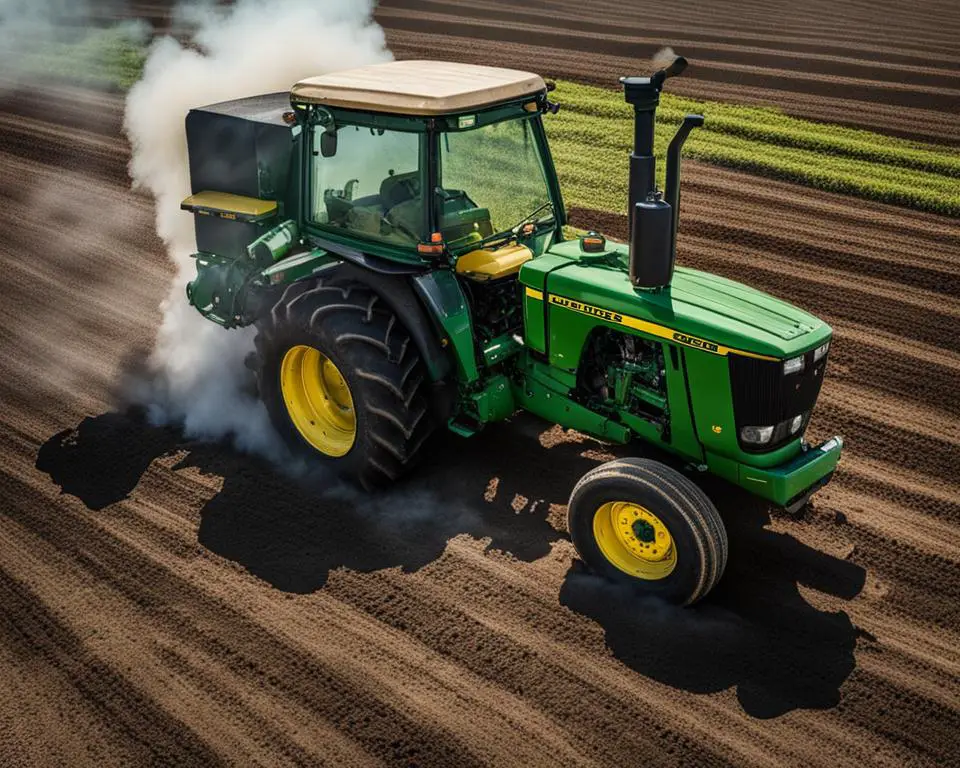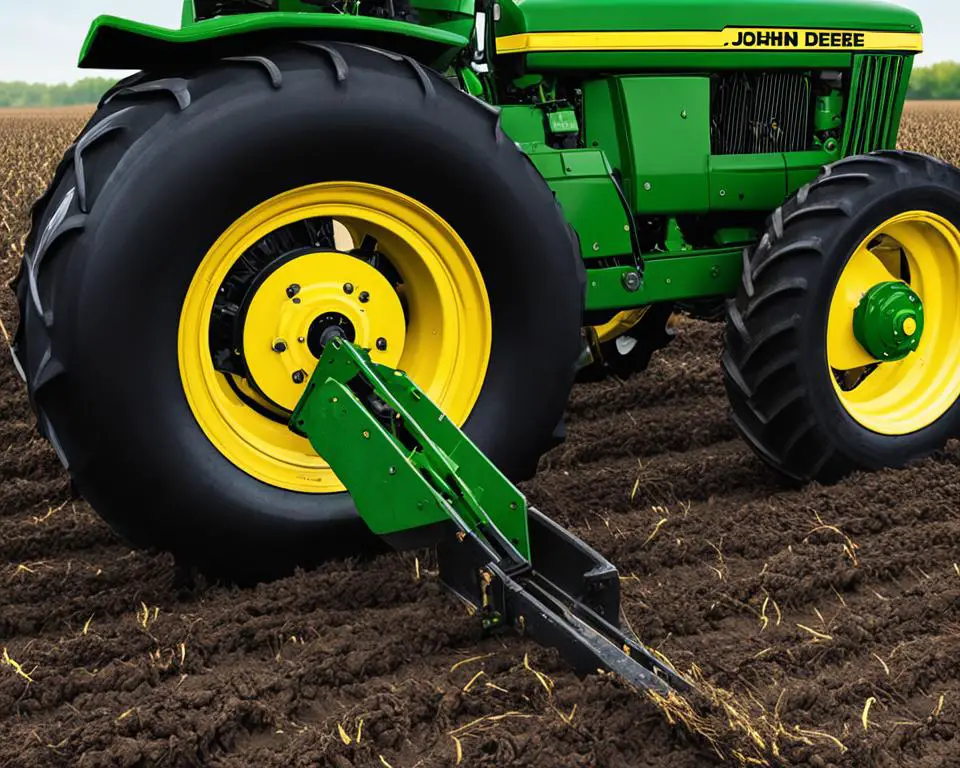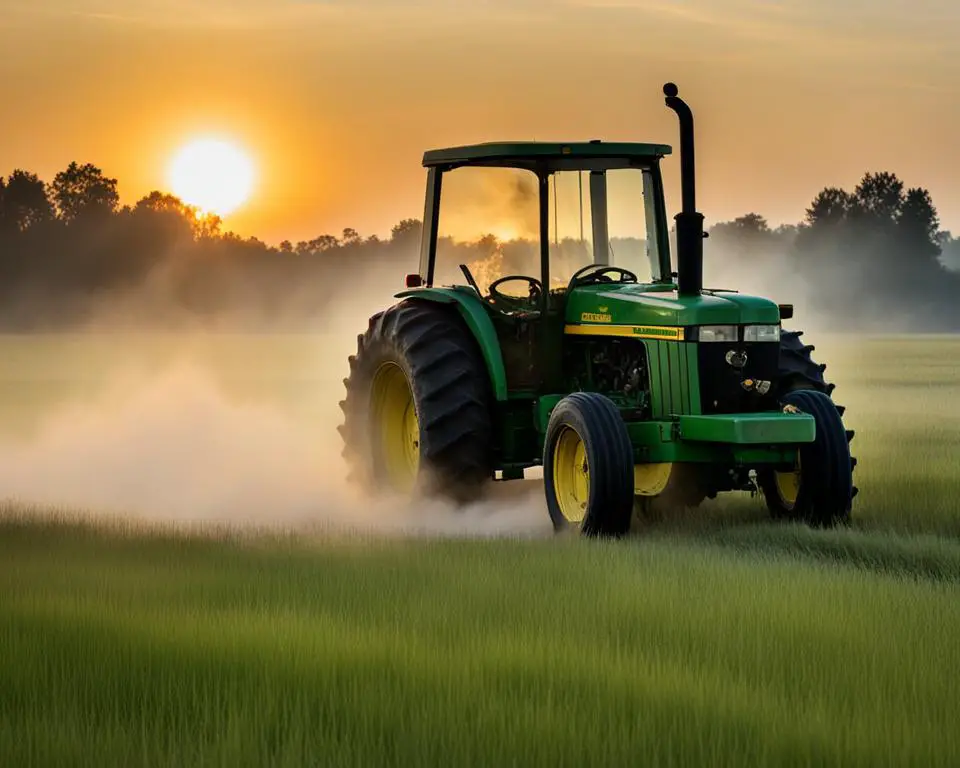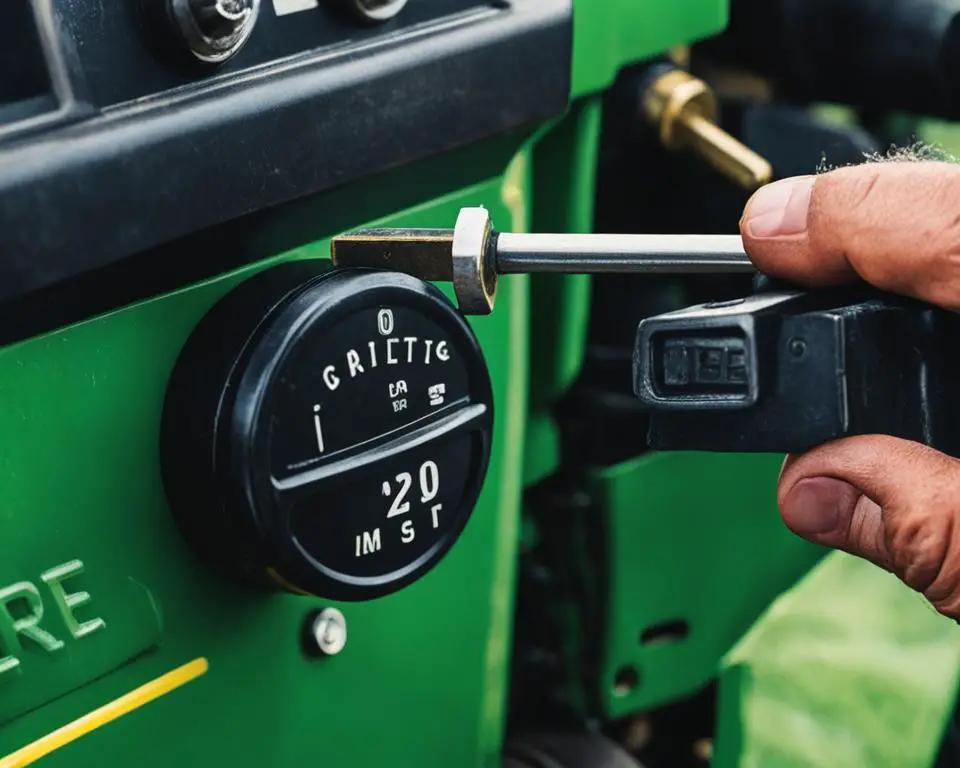The John Deere 2840 tractor, like any other equipment, can experience common problems that may affect its performance. Some of the issues reported by users include starting problems, engine overheating, steering difficulties, engine stalls, and low engine power. These problems can be caused by various factors such as clogged fuel filters, damaged parts, loose connections, and inadequate maintenance. By understanding these common issues and their potential solutions, tractor owners can effectively troubleshoot their John Deere 2840 and ensure optimal performance.
Starting Problems and Solutions
One common issue with the John Deere 2840 tractor is difficulty starting the engine. This can be caused by a faulty battery, loose connections, defective starter solenoid, or clogged fuel filters.
To address this problem, tractor owners can take several steps to troubleshoot and resolve the starting issues:
- Check the battery voltage to ensure it has sufficient charge.
- Clean the battery terminals to improve connections and prevent corrosion.
- Inspect the starter solenoid for defects and replace if necessary.
- Inspect the spark plugs for signs of damage and replace if needed.
- Check the fuel filters for clogs and replace them if necessary.
Additionally, if the starting problems persist, it may be necessary to address fuel-related issues. Clogged fuel filters or damaged fuel injection nozzles can impede the engine’s ability to start. In such cases, replacing the filters or repairing the fuel system can help resolve the starting problems.
Engine Overheating and Solutions
Engine overheating is a common problem faced by John Deere 2840 tractor owners. This issue can lead to significant damage if not addressed promptly. Understanding the potential causes and solutions for engine overheating is essential for troubleshooting and maintaining optimal performance.
Common Causes of Engine Overheating
Several factors can contribute to the engine overheating in the John Deere 2840 tractor:
- Clogged radiator fins restrict airflow, impairing the cooling system’s efficiency.
- Leaked radiator caps compromise the system’s ability to maintain proper pressure.
- Inadequate cooling fluid levels decrease the cooling capacity.
- Loose or damaged driving belts result in insufficient circulation of coolant.
- Insufficient engine oil can impair heat dissipation and lubrication.
Solutions for Engine Overheating
To resolve engine overheating issues in the John Deere 2840 tractor, tractor owners can take the following steps:
- Regularly clean the radiator fins to remove any debris or blockages.
- Replace any leaked radiator caps to ensure proper pressure is maintained.
- Monitor and maintain the coolant at the recommended levels to optimize cooling.
- Tighten or replace any loose or damaged driving belts to ensure proper circulation.
- Maintain the engine oil levels according to the manufacturer’s guidelines for optimal heat dissipation and lubrication.
Additionally, it’s vital to consider the transmission when troubleshooting engine overheating. Transmission overheating can indirectly lead to engine overheating. Reducing the transmission load and regularly inspecting cooling components and fluid levels can help prevent overheating issues.
Heat is the arch-nemesis of engines. By addressing engine overheating promptly and implementing regular maintenance practices, tractor owners can ensure their John Deere 2840 performs optimally for years to come.

| Potential Causes | Solutions |
|---|---|
| Clogged radiator fins | Clean the radiator fins regularly to remove debris and blockages. |
| Leaked radiator caps | Replace any leaked radiator caps to maintain proper pressure. |
| Inadequate cooling fluid levels | Monitor and maintain coolant at recommended levels for optimal cooling. |
| Loose or damaged driving belts | Tighten or replace loose or damaged belts to ensure proper circulation. |
| Insufficient engine oil | Maintain engine oil levels according to manufacturer’s guidelines for adequate heat dissipation and lubrication. |
Steering Difficulties and Troubleshooting
Some users of the John Deere 2840 tractor have reported steering difficulties, including stiff steering, unresponsive steering, or the tractor leaning to one side. These issues can be caused by various factors related to the hydraulic system and steering components.
Worn or damaged steering column shafts or couplings can result in reduced steering effectiveness. Tractor owners should inspect these parts regularly and replace them if necessary.
Air in the hydraulic steering system can also lead to steering problems. Tractor owners can bleed the system to remove air bubbles and ensure smooth steering operation.
Clogged steering filters can restrict the flow of hydraulic fluid, causing steering difficulties. It is recommended to clean or replace these filters periodically to maintain optimal performance.
Another potential cause of steering problems is damaged power steering control valves. Tractor owners should check the valves for any signs of wear or damage and replace them as needed.
In addition, loose steering linkage components, insufficient tire pressure, and worn bearings can contribute to steering difficulties. Regular inspection and maintenance of these components are essential to ensure proper steering functionality.
By addressing these potential issues and regularly maintaining the hydraulic system and steering components, tractor owners can troubleshoot steering difficulties and optimize the performance of their John Deere 2840 tractor.

Engine Stalls and Solutions
Engine stalls can be a frustrating and disruptive issue for John Deere 2840 tractor owners. There are several potential causes for engine stalls, including a faulty fuel injection pump, clogged fuel or air filters, low coolant temperature, fouled spark plugs, stale fuel, or a clogged fuel system. It is essential to troubleshoot and address these problems promptly to restore the tractor’s reliable performance.
A common culprit for engine stalls is a faulty fuel injection pump. If the pump is not supplying the correct amount of fuel to the engine, it can cause stalling. In such cases, repairing or replacing the fuel injection pump is necessary to resolve the issue. Tractor owners should consult with a qualified technician or refer to the tractor’s manual for guidance on the proper steps to take.
Clogged fuel or air filters can also lead to engine stalls. It is crucial to regularly inspect and clean or replace these filters to ensure uninterrupted fuel and air flow to the engine. Clean filters optimize engine performance and prevent stalling episodes.
Low coolant temperature can contribute to engine stalls, especially during colder weather conditions. Tractor owners should ensure that the coolant level is sufficient and that the tractor’s engine has reached the appropriate operating temperature before engaging in heavy work. Warming up the engine adequately can prevent stalling and promote smoother operation.
Fouled spark plugs can cause misfires and eventually lead to engine stalls. Tractor owners should regularly inspect and replace spark plugs as part of their maintenance routine. Clean spark plugs improve ignition and combustion, maintaining engine stability and preventing stalls.
Using stale fuel is another potential cause of engine stalls. Tractor owners should ensure that they use fresh, clean fuel and avoid using old or contaminated fuel that can impair engine performance. Additionally, keeping the fuel system clean by periodically cleaning or flushing it will help prevent clogs and stalls.
Regular maintenance and fuel system cleaning are essential for preventing engine stalls in the John Deere 2840 tractor. By adhering to recommended maintenance schedules and addressing any issues promptly, tractor owners can enjoy reliable and uninterrupted performance from their equipment.
| Cause | Solution |
|---|---|
| Faulty fuel injection pump | Repair or replace the fuel injection pump |
| Clogged fuel or air filters | Clean or replace filters |
| Low coolant temperature | Ensure proper coolant levels and warm up the engine |
| Fouled spark plugs | Inspect and replace spark plugs regularly |
| Stale fuel | Use fresh, clean fuel and maintain a clean fuel system |

Regular maintenance and prompt troubleshooting are key to resolving engine stalls and ensuring optimal performance in the John Deere 2840 tractor.
Low Engine Power and Troubleshooting
Tractor owners who are facing the issue of low engine power with their John Deere 2840 may find it frustrating, but there are several potential causes and troubleshooting steps to consider. One common culprit is faulty fuel injection nozzles, which can restrict the flow of fuel to the engine and result in reduced power output. Tractor owners can address this issue by replacing the faulty nozzles with new ones specifically designed for the John Deere 2840. This will help ensure proper fuel delivery and restore the engine’s power.
Another possible cause of low engine power is clogged fuel lines or hoses. Over time, dirt, debris, and sediment can accumulate in the fuel system, restricting the flow of fuel to the engine. Tractor owners can tackle this issue by cleaning the fuel lines and hoses thoroughly. Regular maintenance, such as using fuel additives or cleaners, can also help prevent clogging and maintain optimal engine performance.
Dirty air cleaner elements or filters can also contribute to low engine power. A clogged or dirty air filter can limit the amount of clean air entering the engine, leading to reduced combustion efficiency. Tractor owners should regularly inspect and clean or replace the air cleaner elements or filters as recommended by the manufacturer. This simple maintenance step can have a significant impact on engine power and overall performance.
Additionally, low engine power may be caused by a blown head gasket or low oil levels. A blown head gasket can result in compression loss, leading to decreased engine power. Tractor owners must inspect the head gasket for any signs of damage and replace it if necessary. Maintaining proper oil levels is also crucial as low oil can cause increased friction and poor lubrication, resulting in reduced engine power. Regularly checking and topping up the oil levels can help restore optimal engine performance.
To ensure long-term engine power and performance, regular maintenance and cleaning of the fuel injection system are essential. Tractor owners should follow the manufacturer’s recommendations for maintenance intervals and use high-quality fuel to prevent fuel injection system issues. By taking these preventive measures and addressing any potential problems promptly, tractor owners can troubleshoot low engine power effectively and ensure their John Deere 2840 operates at its best.
FAQ
What are some common problems with the John Deere 2840 tractor?
Some common problems reported by users include starting problems, engine overheating, steering difficulties, engine stalls, and low engine power.
What can cause difficulty starting the engine of the John Deere 2840 tractor?
Difficulty starting the engine can be caused by a faulty battery, loose connections, defective starter solenoid, or clogged fuel filters.
How can starting problems in the John Deere 2840 be addressed?
Tractor owners can check the battery voltage, clean the battery terminals, replace the battery if necessary, and inspect the spark plugs. Additionally, fuel-related issues such as clogged fuel filters or damaged fuel injection nozzles may also cause starting problems and can be resolved by replacing the filters or repairing the fuel system.
What can lead to engine overheating in the John Deere 2840 tractor?
Engine overheating can be caused by clogged radiator fins, leaked radiator caps, inadequate cooling fluid, loose or damaged driving belts, or insufficient engine oil.
How can engine overheating in the John Deere 2840 be resolved?
Tractor owners can clean the radiator fins, replace the radiator cap, ensure proper coolant levels, tighten or replace damaged belts, and maintain the recommended oil levels. Additionally, transmission overheating can contribute to engine overheating, and resolving this issue involves reducing transmission load and inspecting cooling components and fluid levels.
What are some steering difficulties that can occur with the John Deere 2840 tractor?
Steering difficulties can include stiff steering, unresponsive steering, or the tractor leaning to one side.
What can cause steering difficulties in the John Deere 2840?
Steering difficulties can be caused by worn or damaged steering column shafts or couplings, air in the hydraulic steering system, clogged steering filters, damaged power steering control valves, loose steering linkage components, insufficient tire pressure, or worn bearings.
How can steering difficulties in the John Deere 2840 be addressed?
Tractor owners can inspect and replace worn or damaged parts, clean or replace clogged filters, and maintain proper fluid levels in the hydraulic system.
What can cause engine stalls in the John Deere 2840 tractor?
Engine stalls can be caused by a faulty fuel injection pump, clogged fuel or air filters, low coolant temperature, fouled spark plugs, stale fuel, or a clogged fuel system.
How can engine stalls in the John Deere 2840 be resolved?
Tractor owners can repair or replace the fuel injection pump, clean or replace filters, warm up the engine, inspect and replace spark plugs, and ensure a clean fuel supply. Regular maintenance and fuel system cleaning can also prevent these issues.
What can lead to low engine power in the John Deere 2840 tractor?
Low engine power can be caused by faulty fuel injection nozzles, clogged fuel lines or hoses, dirty air cleaner elements or filters, a blown head gasket, or low oil levels.
How can low engine power in the John Deere 2840 be addressed?
Tractor owners can replace faulty fuel injection nozzles, clean fuel lines and hoses, maintain clean air filters, inspect and replace blown head gaskets, and ensure proper oil levels. Regular maintenance and cleaning of the fuel injection system can also help maintain optimal engine power.

Leave a Reply